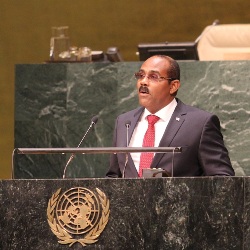The Ongoing Saga of Antigua and Barbuda’s iGambling Dispute with the US

Antigua and Barbados may be a small country, but it’s caught up in one huge dispute with the U.S. government over the issue of online gambling, as despite a WTO court ruling in favor of the Caribbean nation, the United States continues to block access to offshore iGambling sites from the island nation.
What’s at Stake?
With only 81,000 people paying taxes to support the Antigua and Barbados government, the country relies heavily on tax revenues collected from online casinos, sports betting sites and poker operators. However, the U.S. has blocked Americans from accessing these websites, stating that they are illegal, despite the fact that the United States is also a part of the General Agreement on Trade and Services, which allows for companies licensed in other countries to do business in the U.S.
In a court case filed with the World Trade Organization (WTO) court, Antigua and Barbados stated that the U.S. decision to block online gambling sites has cost the country more than $200 million in tax revenues over the last 12 years. They argue that since the U.S. allows for legal off track betting, online lottery ticket sales and some other forms of gambling, then online gambling sites in the country should be allowed to legally offer their services to U.S. residents.
History of the Dispute
The WTO found in favor of Antigua and Barbados back in 2006, but both the Bush and Obama governments subsequently ignored the continued protests from the Caribbean nation. In an effort to allow the island nation to recoup their losses, the World Trade Organization gave Antigua and Barbados the right to sell books, music, movies and other copyrighted material made in the U.S. with the ruling handed down in 2009 allowing the Caribbean country to make up to $21 million from these sales. However, so far the country has not actively pursued this method of obtaining the funds lost due to the prohibition of online gambling, likely due to fear of repercussions from recording artists, film studios and publishing companies.
Future of the Disagreement
In the past, the United States argument against Antigua and Barbados was a bit stronger as no states had legalized online gambling at that time. With three states now allowing residents to access licensed iGaming sites and more expected to legalize online gambling in the near future, it is becoming more difficult to defend the idea that American law prohibits online gambling entirely. To complicate the matter even more, the U.S. Justice Department issued a statement saying that online casinos and poker websites should not be banned at the federal level.
As the United States is preparing for an election in November 2016, the government of Antigua and Barbados is likely hoping that a change in power may finally lead to a resolution; however, there is no indication that either Donald Trump or Hilary Clinton would push to allow offshore poker, casino and sports betting sites to be legal in the U.S. In other words, the saga is only likely to continue.
Background
In the early days of online gambling, a number of international operators set up their servers in Antigua and Barbuda, and by the year 2000, the country was generating $1.7 billion in annual revenues. By 2001 that figure had risen to $2.4 billion, with more than 1,000 people employed within the industry. Needless to say that income soon became a vital part of the island’s economy, but before long the US started going after and prosecuting online gaming executives operating from the country, causing a collapse of the sector. While Antigua and Barbuda experienced a dramatic reduction in its online gambling revenues, the U.S. proved the major beneficiary, and as Antigua’s prime minister, Gaston Browne (photo), explains:
“The US benefited by hundreds of millions of dollars from penalties and fines derived from prosecuting internet gaming operators who were located in Antigua and Barbuda.”
In the meantime, the U.S. government has either denied any wrongdoing, or more recently offered to pay a level of compensation that was not deemed as a serious offer by the island’s government.
“The Cabinet has agreed that proposals put to us by the US authorities do not represent a serious commitment to resolve the issue. The proposals from the US are regrettably paltry,” stated Gaston Browne.









